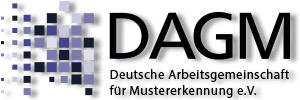DAGM Young Researchers Forum: Best Master's Thesis Award
Since 2016, the DAGM has granted an award for the best Master's thesis handed in as a regular submission to the GCPR. The criteria for submissions can be found at https://www.dagm.de/awards/dagm-young-researchers-forum. The reward is endowed with 500 euros.
Best Master's Thesis Award 2023
In 2023, the Best Master's Thesis Award was granted to Felix Seegräber for his thesis
Underwater Multiview Stereo Using Axial Camera Models
Best Master's Thesis Award 2022
In 2022, the Best Master's Thesis Award was granted to Hendrik Mehrtens for his thesis
Improving Robustness and Calibration in Ensembles with Diversity Regularization
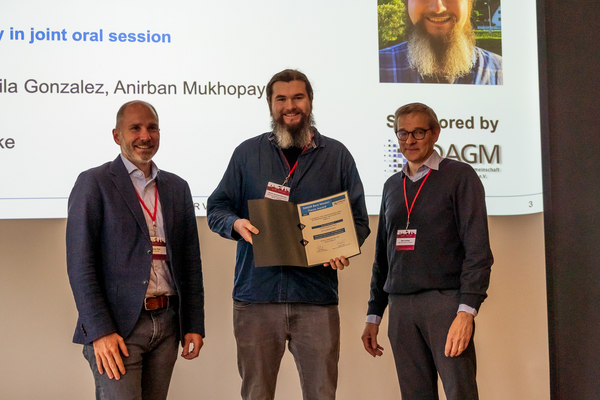
Pictured left to right: Prof. Dr. Stefan Roth (Vice Chairman of the German Association for Pattern Recognition DAGM), Hendrik Mehrtens, Prof. Dr. Bernt Schiele (Chairman of the German Association for Pattern Recognition DAGM)
Hendrik Mehrtens wrote his master thesis at TU Darmstadt under the supervision of Camila Gonzalez and Anirban Mukhopadhyay. The goal of his thesis was the improvement of robustness and calibration via diversity regularization. The reviewers consistently highlighted the importance of the problem statement, the technical expertise of its realization, and the well-crafted and educational exposition of the work.
Best Master's Thesis Award 2021
In 2021, the Best Master's Thesis Award was granted to Anurag Das for his thesis
(SP)2 Net for Generalized Zero-Label Semantic Segmentation

Pictured top to bottom: Prof. Dr. Jürgen Gall, Prof. Dr. Bernt Schiele (Chairman of the German Association for Pattern Recognition DAGM), Prof. Dr. Reinhard Koch, Anurag Das
Anurag Das wrote his thesis at Saarland University in June 2021, supervised by Prof. Dr. Bernt Schiele, Prof. Dr. Zeynep Akata, Dr. Yongqin Xian, and Dr. Yang He. The goal of his master thesis was zero-label semantic image segmentation to segment both seen and unseen classes in an image. In his work he 1) proposes to leverage class-agnostic segmentation priors based on superpixels and 2) proposes a superpixel pooling layer as an intermediate layer for deep networks. Taken together, this achieves convincing results on standard benchmark datasets.
Best Master's Thesis Award 2020
In 2020, the Best Master's Thesis Award was granted to Yifei Zhang for his thesis
Synthesizing Human Pose from Captions
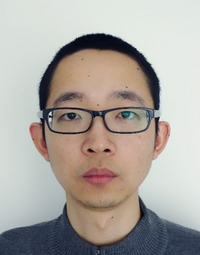
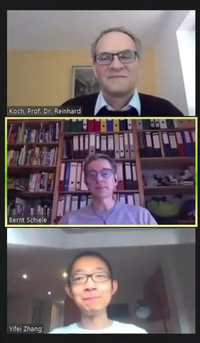
Pictured top to bottom: Prof. Dr. Reinhard Koch (Chairman of the German Association for Pattern Recognition DAGM), Prof. Dr. Bernt Schiele (Vice Chairman of the German Association for Pattern Recognition DAGM), Yifei Zhang
Yifei Zhang wrote his thesis at the RWTH Aachen in March 2020, supervised by Rania Briq, Julian Tanke, Jürgen Gall, and Michael Weinmann.
Best Master's Thesis Award 2019
In 2019, the Best Master's Thesis Award was granted to Cathrin Elich for her thesis
3D Instance Semantic Segmentation on Point Clouds
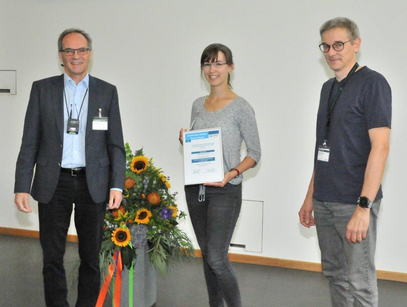
Pictured left to right: Prof. Dr. Reinhard Koch (Chairman of the German Association for Pattern Recognition DAGM), Cathrin Elich, Prof. Dr. Bernt Schiele (Vice Chairman of the German Association for Pattern Recognition DAGM)
Cathrin Elich wrote her thesis at the RWTH Aachen, supervised by Prof. Dr. Bastian Leibe.
Best Master's Thesis Award 2018
In 2018, the Best Master's Thesis Award was granted to Michael Strecke for his thesis
Regularizers for a Sublabel-accurate Variational Lifting Framework
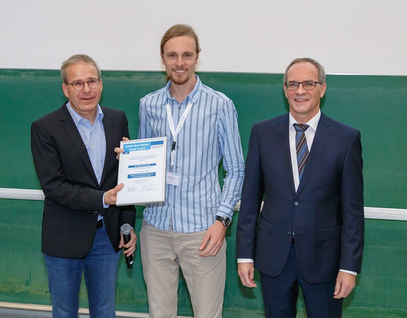
Pictured left to right: Prof. Dr. Helmut Mayer (Speaker of the Technical Committee of the German Association for Pattern Recognition DAGM), Michael Strecke, Prof. Dr. Reinhard Koch (Chairman of the German Association for Pattern Recognition DAGM)
Michael Strecke has obtained both the BSc and the MSc from the University of Konstanz. During his Bachelor studies, he spent half a year in Canberra, Australia. Right now he is pursuing his PhD at the Max Plank Institute for Intelligent Systems in Tübingen. His Master Thesis “Regularizers for a Sublabel-accurate Variational Lifting Framework” supervised by Bastian Goldlücke led to the paper “Sublabel-accurate Convex Relaxation with Total Generalized Variation Regularization”. The latter presents “a novel regularization strategy for lifted second order Total Generalized Variation”. It is “compared with related work on the problems of denoising and light field disparity estimation”. The reviewers have noted that “good results are shown across different applications”, a “very good overview of related work with appropriate citations” is given and that it is a “very advanced topic for a young researchers forum contribution”.
Best Master's Thesis Award 2017
In 2017, the Best Master's Thesis Award was granted to Mian Ahsan Iqbal for his thesis
Convolutional networks for Action Recognition
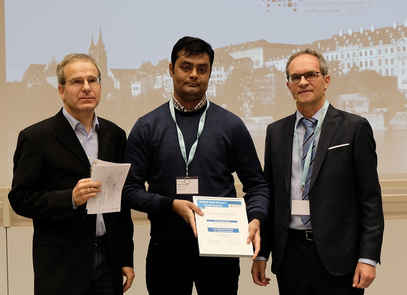
Pictured left to right: Prof. Dr. Helmut Mayer (Speaker of the Technical Committee of the German Association for Pattern Recognition DAGM), Mian Ahsan Iqbal, Prof. Dr. Reinhard Koch (Chairman of the German Association for Pattern Recognition DAGM)
Mian Ahsan Iqbal obtained the BSc from the University of Punjab, Lahore (Pakistan) and the MSc at the University of Bonn, both in Computer Science. He is right now pursuing his PhD also at the University of Bonn. His Master Thesis about “Convolutional Networks for Action Recognition” led to the paper “Recurrent Residual Learning for Action Recognition”. It extends the image classification model ResNet by introducing recurrent connections that allow to learn a spatio-temporal residual. As only a limited range of preceding image frames can contribute, training and inference are efficient. Its superior performance is verified on a large-scale action recognition dataset. The reviewers have noted that the “network performs favorably (compared to) a number of investigated variants” and “The idea of a combination of residual and recurrent neural nets is quite new”, hence this Master Thesis has been awarded the Best Master's Thesis Award 2017.
Best Master's Thesis Award 2016
In 2016, the Best Master's Thesis Award was granted to Christine Kroll for her thesis
Segmentation of MRI and Ultrasound Scans using Deep Convolutional Neural Networks
Christine Kroll wrote her thesis at the TU Munich, supervised by Prof. Nassir Navab.
DAGM Young Researchers' Prize
The DAGM Young Researchers' Prize was last awarded in 2009, honoring a contribution to the Young Researchers' Forum. As of 2010, no prizes are awarded at the Young Researchers' Forum anymore. Instead, the young scientists accepted to the Forum are given free admission to the DAGM conference.
DAGM Young Researchers' Prize Jena 2009
Falko Kellner
Environment Modelling and Object Segmentation using an actively steered Time-of-Flight Camera
University of Kiel, Germany
During the years 2006-2008, the DAGM SMI Prize was awarded to young scientists for excellent Diploma theses.
DAGM SMI Prize Winners Munich 2008
1. prize (100 euros) Maria Klodt, University of Bonn
Continuous Global Optimization in Multiview 3D Reconstruction
2. prize (750 euros) Sandro Esquivel, University of Kiel
Calibration of a Multi-Camera Rig from Non-Overlapping Views
3. prize (500 euros) Jan Siegemund, University of Bonn
Reconstruction of Trajectories of Moving Objects by using Stereo Image Sequences
DAGM SMI Prize Winners Heidelberg 2007
1. prize (1000 euros) Mykhaylo Andriluka,TU Darmstadt
Multidimensional Gaussian Process Regression (Diploma thesis)
2. prize (750 euros) Andreas Wedel, University of Bonn
Detektion stationärer Hindernisse in monokularen Bildsequenzen (Diploma thesis)
3. prize (500 euros) Markus Hahn, Ilmenau University of Technology
3D-Segmentierung und Tracking von Teilen des Körpers einer Person im Produktionsumfeld auf Basis des Contracting-Curve-Density-Algorithmus (Diploma thesis)
DAGM SMI Prize Winners Berlin 2006
1. prize (1000 euros) Florian Steinke, University of Tübingen
Implicit Surfaces For Modelling Human Heads (Diploma thesis)
2. prize (625 euros) Jürgen Gall, University of Mannheim
Generalised Annealed Particle Filter- Mathematical Framework, Algorithms and Applications (Diploma thesis)
2. prize (625 euros) Rene Werner, University of Hamburg
Rekonstruktion und Bewegungsanalyse räumlichzeitlicher CT-Bildfolgen (Diploma thesis)
